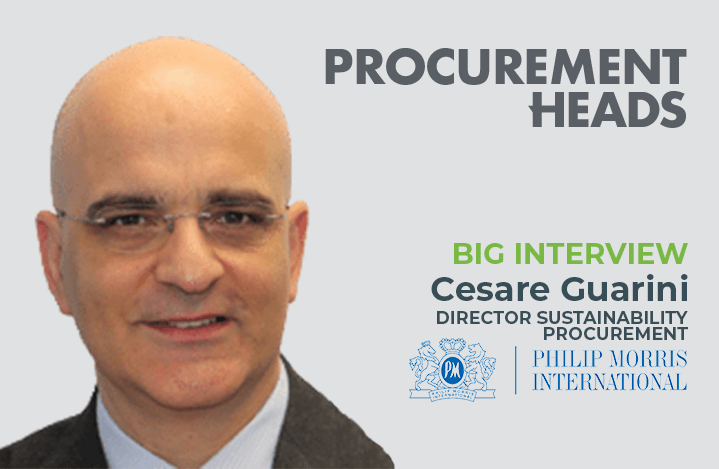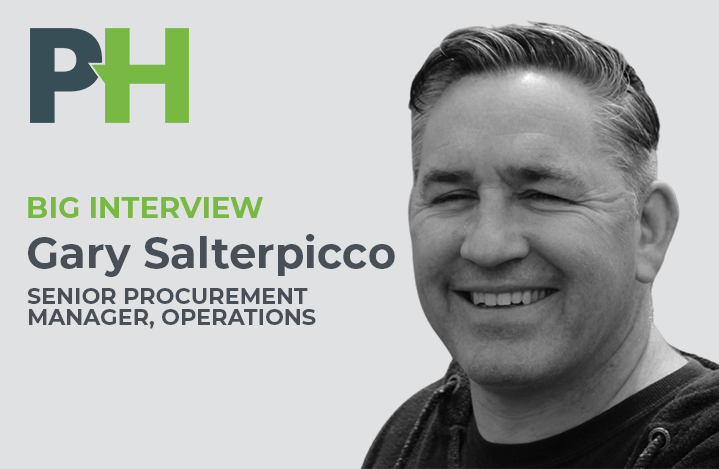He recently spoke to David Hazeldine from Procurement Heads about why he is passionate about driving sustainability and how PMI is approaching it.
What led you to join the Sustainability Procurement team at PMI?
I joined PMI Sustainability Procurement team in July 2019, following seven years at Clariant where I set up the sustainability procurement organisation from scratch.
Clariant and the entire chemical industry have been – and still are – at the forefront in terms of sustainability in supply chains, for instance with the success of the chemical industry initiative “Together for Sustainability” or TfS shows. Representing Clariant in the chemical industry initiative “Together for Sustainability” I was able to acquire deep expertise on sustainability procurement programmes.
During this time, I also developed a passion for working in sustainability. Therefore, I was looking for a new challenging opportunity in a different industry, which Sustainability Procurement at PMI represented.
What attracted you to PMI?
When I started to learn about the commitments, the resources, the results and the ambitions PMI had in terms of sustainability, this opportunity became very interesting to me.
For PMI, exemplary performance on environmental, social, and governance (ESG) issues is important, but it is equally clear that the biggest positive impact we can have on society to be a truly sustainable company is to replace cigarettes with less-harmful alternatives.
This is at the very core of our corporate strategy and sits atop our sustainability priorities. We have developed a cohesive and forward-looking corporate sustainability strategy that has product transformation at the core, while integrating other material social and environmental topics.
I found PMI’s work to be impressive and motivating, especially on how ambitious sustainability objectives and commitments are integrated into every aspect of the company’s strategy. PMI is completely transforming the Tobacco industry as we know it – and at the core of its vision is our product transformation.
Thanks to our scientists and thousands of others at PMI and an investment to date of over $7.2 billion (USD) in science-based innovation – we have done exactly that: developed breakthrough products that are smoke-free.
This is a major industry transformation which PMI is leading and that is where the sustainability journey at PMI begins.
All of the above reasons, and more, were a tremendous motivation for me to join the company.
At PMI, Procurement touches everything from sourcing paper and board, electronics, indirect materials and services, such as vehicles, to machinery and spare parts, to procuring energy as well as laboratory testing. All these activities are a part of a strategic function that at PMI represents a spend of $10 billion per year sourced from more than 34.000 suppliers.
Sustainable Procurement is about ensuring we minimise our environmental and social impact throughout the Supply Chains in which we operate.
How do your suppliers embrace this transformation journey?
Just a few years back, working in sustainability used to be a pretty lonely place and required a lot more resilience than what is still needed today.
When I started my sustainability journey almost eight years ago I recall colleagues telling me: “You know, Cesare, sustainability is very interesting, but here we have a real job to do.”
As years went by, all the eight MBA students from leading business schools we hosted as interns wished sustainability to be the topic to focus on.
During job interviews, “What is your company’s sustainability strategy?” has become the most common question.
We have clearly seen the same type of shifts with our suppliers.
We need to build on this momentum, maintain our focus and efforts, and transfer it to our suppliers to position sustainability as the key topic in their licence to operate and the way we do business.
In fact, our suppliers play a fundamental role in achieving our sustainability targets; some of them are as follows:
- PMI to source sustainably from 100% of our critical suppliers by 2025;
- 50% Carbon footprint reduction in Scope 3 by 2030;
- 100% Zero Deforestation in Packaging by 2022 and in Product by 2025 (Primary Forests).
Soon, companies will either be operating high-performing (meaning: sustainable) supply chains, or be out of business. It is, therefore, not a surprise that our sustainability activities are certainly welcomed and supported by our suppliers.
The speed at which this sustainability shift is happening is increasing. Therefore, business leaders need to dramatically accelerate, in an efficient way, the scalability of their sustainability programmes so that the environmental and human rights crisis we are facing can be successfully addressed.
As a large, international corporation, we need to set example and follow through with our actions, commitments, and results.
And we have an important role towards our suppliers – to engage with them on our journey also through capability building. In fact, medium- and smaller-size suppliers not always have dedicated resources to sustainability and therefore we need to support them even more.
What do you think are the key challenges facing the sustainable procurement agenda?
Firstly, sustainability is a unique opportunity to further elevate procurement. To make our profession more strategic and a greater contributor to the long-term strategy and success of any company.
In fact, our suppliers not only represent the largest portion of our company’s environmental and social exposure, it is also the portion where the highest risks tend to be. It is the most challenging part to address as well, as we need to engage, on-board and influence companies that have different priorities and cultures than PMI.
In general, procurement should invest in capability building to show a step-change in impact and leadership through sustainability.
Secondly, I believe it is key to start with a clear goal in mind: sustainability is not about compliance, but the way we run our business and manage our supply base. Therefore, it is key to set ambitious sustainability objectives and make them an integral part of the key metrics in a procurement organisation, including a reward system – of both your organisation and your suppliers.
As they say: what gets measured gets done, what gets rewarded gets done even better!
While we all try to be unique, I strongly believe that a company’s competitive advantage lies in collaboration around sustainability.
No individual organisation can address the magnitude of the challenges ahead of us, alone. In my view, we must further accelerate cross-stakeholder collaboration towards the development of those ecosystems needed to reach the scalability and efficiencies required. And that is why we are here today.
True success will be achieved when sustainability is fully embedded in our end-to-end supplier lifecycle management, and in the way we reward our results and the ones of our suppliers – the same way we do for price, quality, and service.
And, therefore, sustainability will be more than a corporate initiative and more than just a job.






